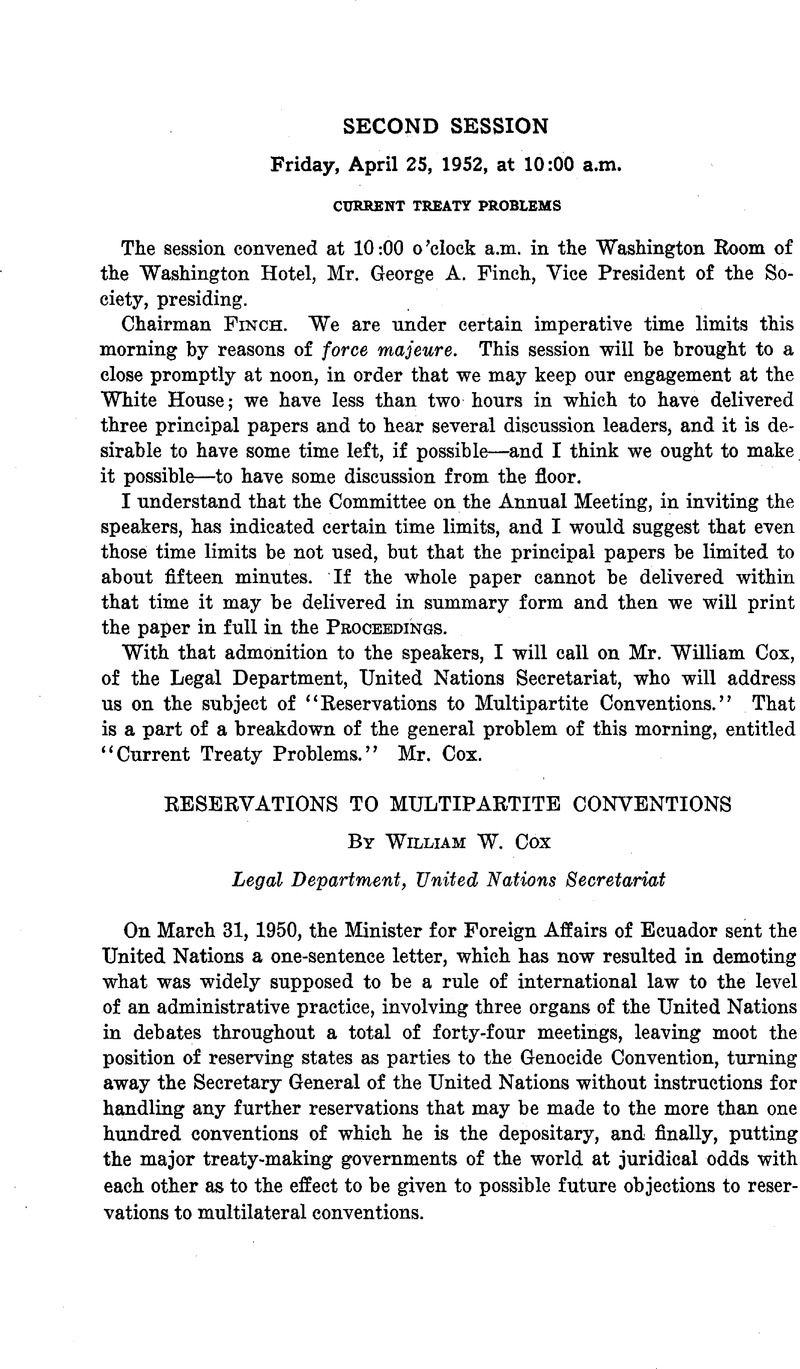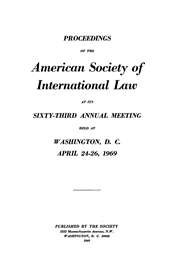No CrossRef data available.
Article contents
Reservations to Multipartite Conventions
Published online by Cambridge University Press: 27 February 2017
Abstract

- Type
- Second Session
- Information
- Copyright
- Copyright © American Society of International Law 1952
References
1 For the correspondence between governments and the Secretariat concerning the reservations to the Convention on the Prevention and Punishment of the Crime of Genocide, see Annexed Documents in Written Statement of the Secretary General, Pleadings, Oral Arguments, Documents, I.C.J. Advisory Opinion of May 28, 1951.
2 For the terms of the resolution see Written Statement of the Organization of America States, op. cit. (supra, note 1), p. 17; Sanders, , “Reservations to Multilateral Treaties,” American Journal of International Law, Vol. 33 (1939), p. 490.CrossRefGoogle Scholar
3 Cf. the language of Art. 6, par. 3, of the Convention on Treaties, Sixth International Conference of American States, Havana, 1928.
4 This rule and the previous practice in the United Nations are fully discussed in the Report of the Secretary General to the General Assembly, Doc. A/1372 (Sept. 20, 1950), General Assembly, 5th Sess., Official Records, Annexes, Item 56.
5 Art. XIII, Convention on the Prevention and Punishment of the Crime of Genocide, reprinted in American Journal of International Law, Supp., Vol. 45 (1951), p. 9.
6 The question was submitted to the fifth session and extensively analyzed by the Secretary General in his Report on Reservations to Multilateral Conventions cited in note 4 above. The debates in the Legal Committee on this Report are contained in General Assembly, 5th Bess., Official Records, Sixth Committee, Summary Records of Meetings (217th-225th Meetings), p. 31 et seq.
7 General Assembly Resolution 478(V), Reservations to Multilateral Conventions, reproduced in American Journal of International Law, Supp., Vol. 45 (1951), p. 13.
8 Report of the International Law Commission Covering the Work of Its Third Session, May 16—July 27, 1951, Ch. II (General Assembly, 6th Sess., Official Records, Supp., No. 9 (A/1858)) ; reprinted in American Journal of International Law, Supp., Vol. 45 (1951), p. 106.
9 “Reservations to the Convention on Genocide,” Advisory Opinion: I.C.J. Reports, 1951, p. 15; American Journal of International Law, Vol. 45 (1951), p. 579 .
10 The debates of the Legal Committee on the advisory opinion of the Court and the Report of the International Law Commission are contained in General Assembly, 6th Sess., Official Records, Sixth Committee, Summary Records of Meetings (264th-278th Meetings), p. 69 et seq. An acute discussion of the resolution adopted by the Committee will be found in the Verbatim Record of the 360th Plenary Meeting of the General Assembly, 6th Sees., Official Records, p. 338 et seq.
11 See, in particular, suggestion of Mr. Fitzmaurice (U. K.) for a system requiring a two-thirds or three-fourths majority of the parties to accept a reservation, thus eliminating the “veto” power (General Assembly, 6th Sess., Official Records, Sixth Committee, Summary Record, 267th Meeting, par. 24), rejected, however, by the U. S. Delegation (ibid., 271st Meeting, par. 45).
12 U.S.S.R.: “the inalienable right of every State to make reservations to any Convention.” Ibid., 269th Meeting, par. 19; see also Written Statement, I.C.J. Pleadings, Oral Arguments, Documents, p. 21. Poland: For a state to object to a reservation is to interfere in matters within the competence of another state. General Assembly, 6th Sess., Official Records, Sixth Committee, Summary Record, 273rd Meeting, par. 5. Czechoslovakia: Even the insertion of a reservations article in future conventions, unless adopted unanimously, would only reinforce the rights of the majority to the serious detriment of the minority. Ibid., 274th Meeting, par. 12.
13 Cf. statement by Sir Hartley Shawcross (U.K.), I.C.J. Pleadings, Oral Arguments, Documents, p. 377, and his appended extracts from authorities, p. 394.
14 Statement by Mr. Benjamin V. Cohen at the 264th Meeting of the Legal Committee of the Assembly.
15 The representative of Chile, however, seems to have been alone in noting that this was one “veto” which was based on the legal equality of states, and therefore not to be feared (Mr. Bernstein, General Assembly, 6th Sess., Official Records, Sixth Committee, Summary Record, 270th Meeting, par. 51). Both he and the Brazilian representative (Mr. Amado, ibid., 267th Meeting) undertook a detailed analysis of the consequences on Pan American treaty-making of the free scope there given to reservations, each concluding that it was undesirable as a United Nations system.
16 Mme. Bastid (France), ibid., Summary Record, 266th Meeting, pars. 3, 7, 8; Mr. Fitzmaurice (U. K.), ibid., 267th Meeting, par. 14; Prof. Bartos (Yugoslavia), ibid., 273rd Meeting, par. 35. The usual semantic obstacle can also be detected in the debates: in protecting their power of reservation the U. S. Delegation was thinking of the type of reservation which is often no more than a Congressional afterthought, the insertion of a point not seriously contested during the drafting conference; the U.S.S.R. was maintaining the right to persist by reservation in a stand expressly voted down during the conference.
17 Although it has repeatedly been argued in favor of the Pan American rule that it has worked well in practice, there has in fact been only one instance to date of such an objection, that of the United States to a reservation by the Dominican Republic to the Convention on Consular Agents. See “Status of the Pan American Treaties and Conventions,” Pan American Union, p. 7; Written Statement of the Organization of American States, I.C.J. Pleadings, Oral Arguments, Documents, p. 19. Cf. the Joint Dissenting Opinion, ’’Reservations to the Genocide Convention,” p. 47: “. . . we are not aware of any ease in which this right [to object to a reservation] has been abused.” The Genocide Convention objections are the first instances in the United Nations (see figures given by Dr. Kerno, Assistant Secretary General in Charge of the Legal Department, General Assembly, 6th Sees., Official Records, Sixth Committee, Summary Record, 272nd Meeting, pars. 11-13), The Harvard Research in International Law, Law of Treaties, American Journal of International Law, Supp., Vol. 29 (1935), cites objection to a German reservation to the 1910 Convention for the Suppression of the White Slave Traffic (p. 875), and to a Cuban reservation to the Protocol on the Revision of the Statute of the Permanent Court of International Justice (p. 904). Judge Hudson adds those to a reservation proposed by the U.S.S.R. if it were to accede to the League Convention for Facilitating the International Circulation of Films of an Educational Character (1933), American Journal of International Law, Vol. 32 (1938), p. 333.
18 See, e.g., the concern expressed by Mr. Fitzmauriee (U. E.) General Assembly, 6th Sess., Official Records, Sixth Committee, Summary Record, 267th Meeting, pars. 15, 19.
19 Resolution 598(V1) of Jan. 12, 1952, reproduced in American Journal of International Law, Supp., Vol. 46 (1952), p. 66. For expressions of diverse groups favoring the resolution as a revolving door permitting different governments to apply conflicting systems to the same reservations, at least subject to possible judicial clarification, see the United States’ explanation of its proposal (General Assembly, 6th Sess., Official Records, Sixth Committee, Summary Records, 266th Meeting, par. 37, 274th Meeting, par. 40); the Soviet explanation of vote cited infra, note 28; and remarks passim of Arab and Latin American representatives (e.g., Egypt, ibid., Summary Record, 275th Meeting, par. 10; Bolivia, General Assembly, 6th Sess., Official Records, Verbatim Record, 360th Plenary Meeting, pars. 219, 220).
20 Advisory Opinion; I.C.J. Reports, 1951, pp. 24, 26.
21 The Advisory Opinion has made clear (p. 27) that the Court will entertain the “dispute” arising between a party accepting a reservation and another objecting to it as incompatible with the object and purposes of the convention. But it seems equally clear that the state most directly concerned, that making the reservation, will not be bound by the decision as to whether it is a party, unless it chooses to intervene under Art. 63 of the Statute of the Court.
22 Advisory Opinion: I.C.J. Reports, 1951, p. 25.
23 U.N. Doc. E/CN.7/AC.3/3, October, 1951.
24 Mid., Sec. 35, par. 2.
25 Ibid., Sec. 26, par. 2(d).
26 See, e.g., General Assembly, 6th Sess., Official Records, Sixth Committee, Summary Record, 265th Meeting, par. 8, and 274th Meeting, par. 37 (Venezuela); 271st Meeting, par. 15 (Egypt).
27 The Advisory Opinion (pp. 26 and 27) has intimated by a modest phrase that, if there are disadvantages from “the divergence of views between parties” which it authorizes, the Court is always available to settle any dispute which its criterion of compatibility may arouse.
28 The Soviet representative on the Legal Committee, in explaining his vote in favor of the text adopted, said it ensured the practical implementation of the inalienable right of states to make reservations to any convention. General Assembly, 6th Sess., Official Records, Sixth Committee, Summary Record, 278th Meeting, par. 12.
29 Advisory Opinion: I.C.J. Reports, 1951, pp. 20, 25.
30 U.N. Doc. E/CN.7/AC.3/3, Sec. 43.
31 Maktos Mr. (U. S.), General Assembly, 6th Sess., Official Records, Sixth Committee, Summary Records, 266th Meeting, par. 37; 270th Meeting, par. 32 (judicial settlement considered available) ; 276th Meeting, par. 31.
32 Convention on Declaration of Death of Missing Persons (1950), Art. 19.
33 See, e.g., Convention for the Prevention and Punishment of Terrorism (1937), and comment of Judge Hudson, in American Journal of International Law, Vol. 32 (1938), p. 334.
34 Op. cit. (supra, note 8), par. 34(5). In particular, the proposal to allow signatories a limited period within which effectively to object to reservations has been very carefully drafted by the Commission.
35 Cf. Schachter, , “The Development of International Law Through the Legal Opinions of the United Nations Secretariat,” British Year Book of International Law, Vol. XXV (1948), pp. 91, 124-125 Google Scholar. In addition to the World Health Assembly, the Contracting Parties to the General Agreement on Tariffs and Trade, acting as an organ, have passed upon reservations.
36 See note 11 above; General Assembly, 6th Sess., Official Records, Sixth Committee, Summary Record, 270th Meeting, par. 23 (Canada); 268th Meeting, par. 47 (Cuba).




